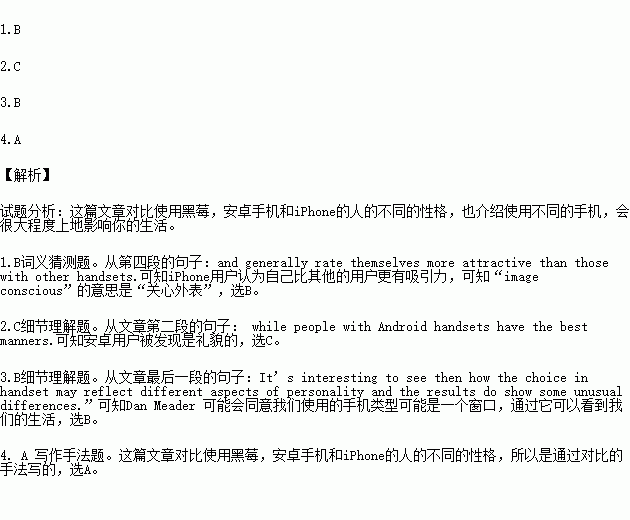题目内容
IPhone owners are vainer(虚荣)and spend more on clothes and grooming(仪容)than those who have BlackBerrys and Android phones, new research claims.BlackBerry owners earn the most and are more likely to have long-term relationships, while people with Android handsets are most creative and the best cooks.
The study, carried out by TalkTalk Mobile, surveyed 2,000 owners of the three major smartphone brands to determine whether the choice of handset was an extension(延伸) of their personality. The study rated users in various walks of life using a point scoring system including personalities, daily habits and the type of industries they work in.
Other results from the study found that people with an iPhone are more image conscious and generally consider themselves more attractive than those with other handsets. They are most likely to describe themselves as adventurous, bright and are most likely to work in media, publishing and education. They also believe their boss rates them highly. Apple owners also tend to have done more travelling and are the most active on social media sites.
BlackBerry owners were found to be the least punctual(准时的), but despite putting in the least hours at work they are the most active phone user—sending more texts and making more calls in the average day than any other phone user. They are more social and have more friends overall. They also earn nearly two and a half thousand pounds a year more than other smartphone owners, with an average salary of $27,406. BlackBerry users classed themselves so loud and mainly work in the health, finance or property sectors. They were also found to drink more tea and coffee each day than any other phone user.
Android owners were found to watch more TV than others and drink the most alcohol—consuming more in an average week than iPhone and BlackBerry drinkers. They have the most jobs in engineering, the government and public services and environmental services. They have the best manners and are more shy and relaxed than their counterparts.
Dan Meader, Director of Mobile at TalkTalk, said,“Many of us have our mobile phones on us almost constantly so they do become an extension of us in many ways. It’s interesting to see then how the choice in handset may reflect different aspects of personality and the results do show some unusual difference
1.The underlined words “image conscious” (Paragraph4) mean caring about _______.
A. income
B. appearance
C. social media
D. interpersonal relationships
2.What were Android users found to be like?
A.Loud. B. Brave. C. Polite. D. Confident.
3.Dan Meader may agree that the kind of mobile phone we use ________..
A.will decide the way we live our life
B.can be a window into the lives we lead
C.can change our personalities gradually
D.has become the most important part of our life
4.How is the text organized?
A.By drawing comparisons.
B. By giving reasons only.
C. By providing examples.
D. By giving solutions.
 天天向上一本好卷系列答案
天天向上一本好卷系列答案 小学生10分钟应用题系列答案
小学生10分钟应用题系列答案
